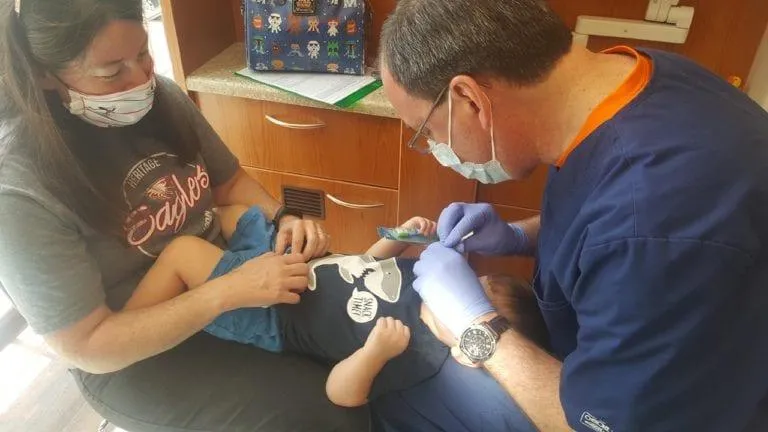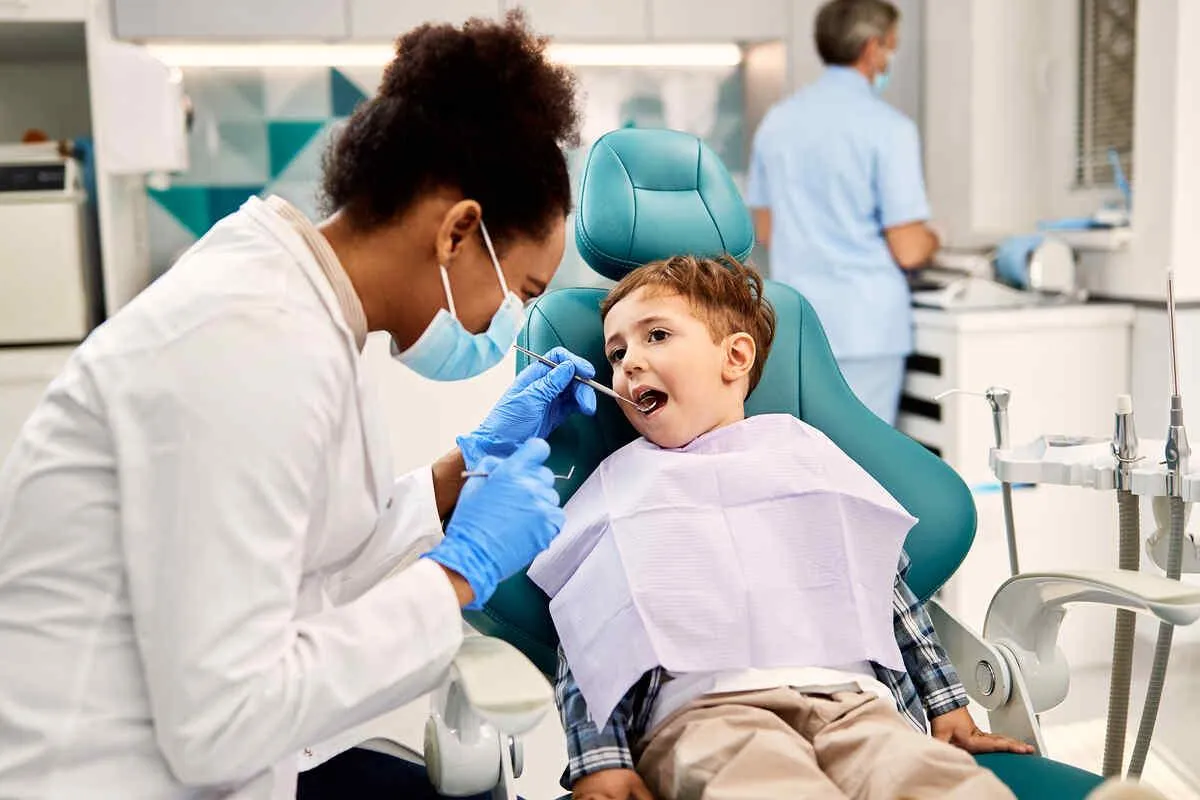WELCOME TO
HURST PEDIATRIC DENTISTRY!
Here at the pediatric dental office of Dr. Joby Hurst, we take pride in offering our young patients the highest quality of dental care in a kid-friendly environment. We are conveniently located in Birmingham, Alabama and are experienced in providing routine dental care for infants, children, teens and patients with special needs.
Dr. Hurst and his team of friendly professionals work together to provide a positive dental experience that will make your child smile! We promise to work with you and your child personally and create a customized treatment plan to meet your individual needs and desires.
Office tour
Early Dental Care
We believe early dental care can promote a lifetime of healthy smiles for your child. We offer a full range of services from routine dental exams and cleanings to fillings, sealants and fluoride treatments that will help ensure that your child grows up with a healthy smile.
Sedation Dentistry
We recognize that for some of our patients, a visit to the dentist makes them a bit nervous.
We offer nitrous oxide sedation for our more apprehensive patients, so they can relax while receiving the dental care that they need.
For those requiring more intensive treatment, Dr. Hurst offers in office anesthesia using Dr. Jeff Plagenhoef.
Dr. Jeff is a board-certified pediatric anesthesiologist with Pediatric Dental Anesthesia Associates.
We appreciate your interest in our practice and encourage you to continue exploring our website to learn more about us. Feel free to contact us to schedule an appointment with Dr. Joby Hurst today!

Blogs and Resources

Stay Prepared: Pediatric Dental Emergency Guide for Parents
Every parent dreads the "Uh oh" moment, especially when it involves a potential dental emergency. A chipped tooth, a throbbing toothache, or a lost tooth can send shivers down any parent's spine. But fear not! Here's a guide to help you navigate pediatric dental emergencies, understand what requires immediate attention, and most importantly, keep your child calm during a stressful situation.
What is a Dental Emergency?
Not every dental issue requires a frantic rush to the dentist. A minor chipped tooth or a loose baby tooth, a natural part of development, can usually wait for a scheduled appointment. However, some situations require prompt professional attention to minimize damage and ensure the long-term health of your child's smile. Here are some red flags that indicate a true pediatric dental emergency:
Knocked-out tooth: Time is of the essence in this situation! The quicker you act, the higher the chances of successfully reimplanting the tooth.
Severe pain or swelling: A throbbing toothache, swollen gums, or facial swelling can all be signs of infection, which needs immediate treatment by a dentist to prevent complications.
Excessive bleeding: While a small amount of bleeding is normal after a minor injury, persistent or uncontrollable bleeding requires a dentist's intervention.
Fractured jaw: If your child has sustained a blow to the face and has difficulty opening or closing their mouth, a misaligned jaw, or facial numbness, seek immediate medical attention, as this could be a fractured jaw.
Imagine 10-year-old Sarah tripping on the playground and landing face-first. Her front tooth is loose and bleeding. This scenario would be considered a dental emergency. The prompt action of rushing Sarah to an emergency dental office could be the difference between saving the tooth and needing a more complex (and expensive) procedure down the line.

During a Dental Emergency: What Happens if You Wait Too Long?
Knowing what to do in the crucial moments following a dental emergency can significantly impact the outcome. Here are some tips for staying calm and taking action:
Stay Calm: A panicked parent can make a scary situation even worse for your child. Take a deep breath and assess the situation.
Control Bleeding: For minor bleeding from the gums or lips, apply gentle pressure with a clean gauze pad.
Save the Tooth: If a tooth is knocked out, locate it carefully (avoid touching the root). Rinse the tooth gently with milk or water (not tap water!) and try to gently reimplant it in the socket. If reimplantation isn't possible, store the tooth in milk and head straight to the dentist.
Manage Pain: Over-the-counter pain relievers like children's Ibuprofen can help manage discomfort until you reach the dentist.
Seek Professional Help: Don't wait! Contact your pediatric dentist or an emergency dental office immediately. Delaying treatment can lead to permanent tooth loss, infection, or even damage to surrounding teeth.
Remember, early intervention is key! Waiting too long to see a dentist for a child's dental emergency can have negative consequences, depending on the specific situation. Here are some potential risks of delaying:
Increased chance of tooth loss: For knocked-out teeth, the sooner you act, the higher the likelihood of successful reimplantation. Delaying treatment can decrease the tooth's viability.
Infection: A dental emergency often involves a break in the gum tissue or tooth, which can create an entry point for bacteria. Prompt treatment with antibiotics can help prevent infection.
More complex treatment: If a tooth is fractured or displaced but not addressed quickly, it might require more complex and expensive dental procedures later.
Pain and discomfort: Dental emergencies often cause significant pain. Delaying treatment prolongs your child's suffering.
If you're unsure whether your child's situation constitutes a dental emergency, it's always best to err on the side of caution and call your dentist or a pediatric dentist for advice.
Take the case of Michael, a 7-year-old who complained about a persistent toothache for a few days. His parents, assuming it was a cavity, decided to wait for their scheduled appointment a week later. By the time they reached the dentist, the toothache had escalated to a throbbing pain, and Michael's face was swollen. The dentist diagnosed an abscessed tooth, a severe infection that could have been prevented with earlier treatment. Michael ended up needing a root canal and antibiotics, a more complex and uncomfortable experience than a simple cavity filling.

Managing Symptoms During a Dental Emergency
Here are some additional tips on how to manage symptoms during a dental emergency:
Chipped or Fractured Tooth: Rinse your child's mouth with warm water and apply a cold compress to the outside of their cheek to reduce swelling.
Toothache: Over-the-counter pain relievers can offer temporary relief. Encourage your child to gently rinse their mouth with warm salt water.
Lost Baby Tooth: This is usually not a cause for concern. However, if there is excessive bleeding, consult your dentist.
Remember, these are just temporary measures. Always seek professional dental care as soon as possible.
Choosing the Right Pediatric Dentist Who Handles Pediatric Dental Emergencies
Having a reliable pediatric dentist who can handle emergencies is crucial for every parent. Here's a roadmap to help you choose:
Qualifications and Experience:
Board Certification: Look for a dentist who is board-certified by the American Association of Pediatric Dentists (AAPD). This ensures they have the specific training and experience to treat children.
Experience: Inquire about the dentist's experience handling pediatric emergencies. Look for a dentist with extensive experience treating children, especially in emergency situations.
Emergency Preparedness:
Emergency Policy: Ask about the dentist's policy for handling emergencies. Do they offer same-day appointments or extended hours?
Referral Network: If the dentist can't see your child immediately, do they have a network of emergency dental providers they can refer you to?
Comfort and Communication:
Child-Friendly Environment: Look for a dental office designed to put kids at ease. Bright colors, toys, and decorations can make a big difference.
Communication Style: The dentist should be able to explain procedures to your child in a way they understand. They should also be patient and answer your questions thoroughly.
Additional Considerations:
Convenience: Location and office hours are important factors. Ideally, the dentist should be close to home and offer flexible hours to accommodate emergencies.
Insurance and Cost: Verify if the dentist accepts your insurance and inquire about their fees, especially for emergency visits.
Reviews and Recommendations: Positive online reviews and recommendations from friends and family can be a great indicator of the dentist's quality.
Taking Action:
Call and interview potential dentists. Ask about their experience, emergency protocols, and office environment.
Schedule a non-emergency appointment to get a feel for the dentist and the office.
By following these steps, you can find a qualified and caring pediatric dentist who can provide excellent dental care for your child, including handling emergencies effectively.
Finding Peace of Mind: The Importance of a Strong Relationship with Your Pediatric Dentist
Peace of mind comes from knowing your child is in capable hands, especially during a dental emergency. Building a strong relationship with your child's dentist goes beyond checkups and cleanings. Here's why:
Familiarity Breeds Comfort: Regular visits to the dentist establish a sense of routine and familiarity for your child. A friendly and welcoming environment can make a big difference when faced with a dental emergency. Your child will feel more at ease with a dentist they already know and trust.
Imagine little Billy needing emergency dental care after a fall. Having a dentist who remembers Billy by name, patiently explains the procedure, and uses age-appropriate language can significantly reduce anxiety and ensure a smoother treatment process.

Early Detection and Prevention: Regular dental checkups allow your dentist to identify potential problems early on. Catching cavities in their initial stages can prevent the need for more invasive procedures down the road.
For example, during a routine checkup, Dr. Jones might notice a small cavity on Sarah's back molar. Early detection allows for a simple filling, preventing the cavity from growing and potentially requiring a root canal in the future.
Proactive Communication: A good pediatric dentist will keep you informed about your child's oral health and discuss potential risks associated with specific dental issues. This open communication allows you to make informed decisions regarding your child's dental care.
Let's revisit Michael's story. During a previous checkup, Dr. Lee noticed a buildup of plaque around Michael's abscessed tooth.
Following through on Dr. Lee's recommendations for improved brushing and flossing techniques might have prevented the infection entirely.
Conclusion
Pediatric dental emergencies can be stressful, but with the right knowledge and preparation, you can navigate them calmly and effectively. Remember, early intervention is key!
For your questions regarding dental emergencies, contact Hurst Pediatric Dentistry at (205) 969-7454. Our team of experienced and caring professionals is dedicated to providing exceptional dental care for your child, from routine checkups to emergencies. We're here to help ensure your child's smile stays healthy and bright!

19 INVERNESS CENTER PARKWAY, STE 250, BIRMINGHAM, AL 35242
TEL: 205.969.7454
E-MAIL: [email protected]
2018 © ALL RIGHTS RESERVED | PRIVACY POLICY | TERMS AND CONDITIONS
Site by Trustway Marketing Powered by Kyrios Systems